| Title | From breaking bad to worse: exploiting homologous DNA repair deficiency in cancer. |
| Publication Type | Journal Article |
| Year of Publication | 2014 |
| Authors | Hemann, MT |
| Journal | Cancer Discov |
| Volume | 4 |
| Issue | 5 |
| Pagination | 516-8 |
| Date Published | 2014 May |
| ISSN | 2159-8290 |
| Keywords | Antineoplastic Agents, DNA Repair Enzymes, Humans, Molecular Targeted Therapy, Mutation, Neoplasms, Recombinational DNA Repair |
| Abstract | DNA repair deficiencies are common among cancer cells and represent a potential vulnerability that might be exploited by targeting compensatory repair pathways. However, the identification of synthetically lethal combinations of DNA repair defects, although of significant clinical relevance, has been somewhat anecdotal. Although numerous models have been proposed to explain synthetic lethality among DNA repair mutations, we have only a limited understanding of why a given mutation should render cells sensitive to another. In this issue of Cancer Discovery, Dietlein and colleagues define a general connection between mutations in genes involved in homologous recombination and sensitivity to inhibitors of non-homologous end joining. In doing so, they provide a mechanism to demarcate a set of seemingly diverse tumors that may be highly responsive to established DNA repair-targeted therapeutics. |
| DOI | 10.1158/2159-8290.CD-14-0316 |
| Alternate Journal | Cancer Discov |
| PubMed ID | 24795010 |
| PubMed Central ID | PMC4384127 |
| Grant List | U54 CA112967 / CA / NCI NIH HHS / United States |
